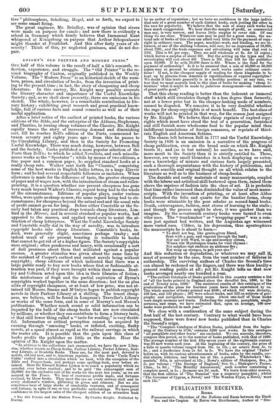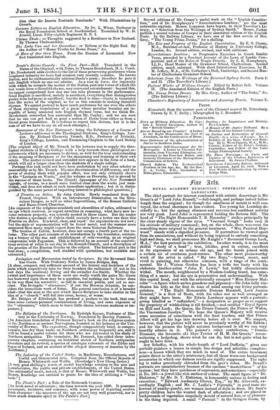PUBLICATIONS RECEIVED.
Booxs.
Transcaucasia. Sketches of the Nations and Races between the Black Sea and the Caspian By Baron von liaxthausen, Author of "Stn-
dien iiber die Inneni Zustande Russlands." With Illustrations by Greaeb,
aeroutn Letters on English Education. By Dr. L. Wiese, Professor in the Royal Foundation School at Joachimsthal. Translated by W. D. Arnold, Lieut. Fifty-eighth Regiment B. N. I.
Ultima Thule; • or Thoughts suggested by a Residence in New Zealand. By Thomas Chohnondeley. 27ze Lady Erna and her Queendom : or Reform at the Right End. By the Author of "Home Truths for Home Peace," &c.
A Hero of Our Own Times. From the Russian of Lermontof. Now first translated into English.
Dante's Divine Comedy : the First Part-Hell. Translated in the Metre of the Original, with Notes, by Thomas Brooksbank, M.A. Camb. [1dr. Brooksbank adds another to the list of those persevering gentlemen whose misplaced industry we have had occasion very recently to notice. He knows Italian, and be enthusiastically admires Dante's poem ; therefore he puts it into English which no one can admire. As a tour de force, the ingenuity with which he compels the matter of the Italian poetinto verses of which the last words form a threefold rhyme, may command astonishment : beyond this, we cannot comprehend how any one can take pleasure in the performance. Good English is sacrificed, melody is sacrificed, everything that distinguishes poetry from bad prose is sacrificed ; but the deed is done-Danto is translated into the metre of the original, so far as this consists in making threefold rhymes. We cannot pretend to have much preference for one over the others of these rhyming translations of a poem whose peculiar beauties are in- capable of being rendered into English rhymed verse, but we think Mr. Brochsbank somewhat less successful than Mr. Cayley ; and we are sure that no one can get half so good a notion of Dante from either as from a literal prose translation. It is tedious to repeat this dictum, but it is the sun of all we have to say on all such attempts.] Synonyms of the New Testament; being the Substance of a Course of Lectures addressed to the Theological Students, King's College, Lon- don. By Richard Chenevix Trench, B.D., Professor of Divinity, King's College, London, and Examining Chaplain to the Lord Bishop of London,
original object of Mr. Trench in his lectures was to supply the thee- ogieal students of King's College with a help towards those philological ac- quirements which are necessary to divines, as well for the true understanding of the meaning of Scripture as for the sharpening and training of their own minds. The matter revised and extended now appears in the form of a book, which will aid a larger class than the students of a single college.
Perhaps this task could not have been undertaken by any other scholar so suceessfully as by Mr. Trench. His nice discrimination of differences, and the power of stating them with .popular effect, was not only critically shown in the "Lectures on Words,' and the volume on Proverbs, but is proved by the success of those books. The (Greek) Synonyms of the New Testament appeals, of course, to a much more limited class than the works just men- tioned, and does not admit of such immediate application ; but it is distin- guished by the same power of imparting interest to philological questions.] A Treatise on Relics- By John Calvin. Newly translated from the French Original. With an Introductory Dissertation on the Mira- culous Images, as well as other Superstitions, of the Roman Catholic and Russo-Greek Churches.
[An exposure of the religious mischiefs and absurdities of relics, addressed to an age which received, as cogent novelties in reasoning, what have now be- come common property, was scarcely needed in these times. But the reader who desires a specimen of Calvin could scarcely have a better one than this Tneatise on Relics. It is brief, clear, and rapid : the arguments are not new ; but the style of argumentation will be found novel, and the manner more measured than many might expect from the stern Genevan Reformer.
The treatise of Calvin, however, does not occupy a fourth part of the vo- ]ume. The other part consists of an introduction by the translator, contain- ing a history of the rise and establishment of relic-worship, as an original compromise with Paganism. This is followed by an account of the supersti- tious revival of relics in our day in the Romish Church, and a description of the practice of the Russian Greeks on the subject. The historical part is the best done; a compilation, well studded with quotations, but readable and animated.]
Irvisegism. and Mormonism tested by Scripture. By the Reverend Emi- lius Guers. With Prefatory Notice by James Bridges, Esq: [A close, compact, and sufficient account of the history and doctrines of the seta which respectively take for their founders the enthusiast (if not in his last days the madman) Irving and the swindler Joe Smith. Whether the extent and importance of these sects are really worth the pains Mr. Guers has bestowed upon them may be a question, but nothing can be better done in its way than his narrative; so full in essential points, and yet so suc- cinct. The Irvingite "utterances," if not the Mormon delusion, he con- siders the immediate work of Satan. His general conclusion is of a broader kind-that the man or the sect which leaves Scripture to take shelter in the idea of a "church" will fall into error, heresy, or worse.
Mr. Bridges of Edinburgh has prefixed a preface to the book, that con- tains some curious personal reminiscences of Irving, and some exposure of the "utterances," which seem to leave little choice between madness or im- posture.]
The Religion of the Northman. By Rudolph Keyser, Professor of His-
tory in the University of Norway. Translated by Barclay Pennock. [An American translation of Professor Keyser's book on the religious system of the Nordin:len or ancient Norwegians, founded on his lectures at the 'Uni- versity ilficorviay. The exposition, though comparatively brief, is compre- hensive, less dry than books on Northern archeology frequently are, and it will be found a useful volume for those who are interested in the study of Northern antiquities. The translator, Mr. Pennock, has added three intro- ductory chapters, containing an historical sketch of Northern antiquarian literature and its revival, a species of catalogue riticennee of the Eddas and Sagas of Iceland, and an account of the alleged discovery of America by the Northmen.]
The Industry of the United States, in Machinery, Manufactures, and Useful and Ornamental Arts. Compiled from the Official Reports of Messrs. Whitworth and Wallis. (Routledge's New Cheap Series.)
[A. very good shilling's worth of useful knowledge relating to the arts and manufactures, the public and private establishments, of the United States. The substantial merit, indeed, is that of Messrs. Whitworth and Wallis, but Messrs. Routledge are entitled to praise for the idea of utilizing a "blue book."]
The Pirate's Fort ; a Tale of the Sixteenth Century. [An Irish novel of adventure ; the time towards the year 1690. It possesses movement, incidents, and romance, with some power of depicting modern Irish character : the manners of the age are not very well preserved, nor is there much dramatic spirit in The Pirate's Fort.]
Second editions of Mr. Creasy's useful work on the "English Constitu- tion," and of Dr. Humphreys's " Exercitationes lambicm," are the most noticeable reprints. Messrs. Longman have begun, in their Traveller's Li- brary, a "Selection from the Writings of Sydney Smith." Messrs. Parker publish a second volume of Cowper in their annotated edition of the English Poets. In the Railway Library, we have one of the first novels of Mrs. Grey, "The Young Prima Donna," for a shilling.
The Rise and Progress of the English Constitution. By E. S. Cressy, M.A., Barrister-at-law, Professor of History in University College, London, &c. Second edition, revised, and with additions. Evercitationes Iambion ; or Progressive Exercises in Greek Iambic Verse, preceded by a Succinct Account of the Laws of Iambic Com- position and of the Rules of Tragic Prosody. By E. R. Humphreys, LLD., Head Master of the Grammar School, Cheltenham. Second edition, much enlarged. With short Introductory Exercises, by H. M. Jeffery, M.A., of St. Catherine's Hall, Cambridge, and Second Mas- ter of Cheltenham Grammar School.
Selections from the initings of the Reverend Sydney Smith. Parts I: and II. (The Traveller's Library.) Poetical Works of William Cowper. Edited by Robert Bell. Volume _ II. (The Annotated Edition of the English Poets.) The Young Prima Donna. By Mrs. Grey, Author of" The Duke," &c. (The Railway Library.) Chambers's Repository of Instructive and Amusing Tracts. Volume X.
PRLNT.
Eronstadt, from the narrow part of the Channel nearest St. Petersburg. Drawn by E. T. Dolby ; lithographed by J. Brandard.
PAMPHLETS.
Baylis», ; its Importance and History-. Ilya Layman. A Memoir of Mr. Justice Talfourd. By a,. Member of the Oxford Circuit.
On Decline and Restoration of General Health ; in a series of Essays. No. I. Debility of the Skin, Baths and Bath- ing. By G. West Piggott, M.A., M.D., Cantab., Fellow of St. Peter's College, Cambridge, and Fellow of the Case- bridge Philosophical Society.
The Three Warnings ; or Facts and Figures of the Cholera Epidemics of Gateshead. By James Clephan. Speeches on University Reform. delivered at Liverpool. April 25, 1854. With a Few Words of Introduction by a Cam,. bridge Man. Notes on Military Education, By Cap- tain J. Morton Spearman, Author of the "British Gunner."
Are we Bound by our Treaties? A Letter to the Right Honourable the Earl of Aberdeen, on the Confiscation of Bemr. Some Instances of the Administration of Justice in Southern India.
Representative Self-Government for the Metropolis. A Letter to Viscount Pal- merston, from Viscount Ebriugton, ex- Secretary to the Poor-law Board, and formerly Chairman of the Metropolitan Commission of Sewers.
Church Reform, The Ecclesiastical Problem of the Age, Re. By the Rev. E. A. Verity, ED.. Incumbent of Habergham, Lancashire.



































 Previous page
Previous page